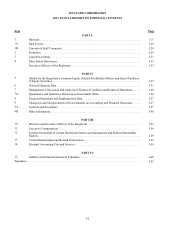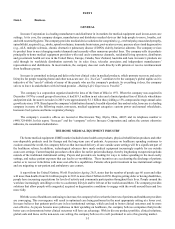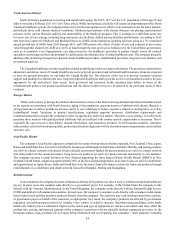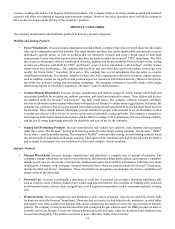Invacare 2015 Annual Report Download - page 18
Download and view the complete annual report
Please find page 18 of the 2015 Invacare annual report below. You can navigate through the pages in the report by either clicking on the pages listed below, or by using the keyword search tool below to find specific information within the annual report.I-12
commercially in the U.S. are subject to periodic inspections by the FDA. Furthermore, state, local and foreign governments have
adopted regulations relating to the design, manufacture and marketing of health care products.
Consent Decree
In December 2012, the company reached agreement with the FDA on the terms of the consent decree of injunction with
respect to the company's Corporate facility and its Taylor Street wheelchair manufacturing facility in Elyria, Ohio. A complaint
and consent decree were filed in the U.S. District Court for the Northern District of Ohio, and on December 21, 2012, the Court
approved the consent decree and it became effective. The consent decree limits the company's manufacture and distribution of
power and manual wheelchairs, wheelchair components and wheelchair sub-assemblies at or from its Taylor Street manufacturing
facility. The decree also initially limited design activities related to wheelchairs and power beds that take place at the impacted
Elyria, Ohio facilities. The company is entitled to continue to produce from the Taylor Street manufacturing facility certain
medically necessary wheelchairs provided that documentation and record-keeping requirements are followed, as well as ongoing
replacement, service and repair of products already in use, under terms delineated in the consent decree. The consent decree
specifies the terms under which the company may resume full operations at the impacted facilities. The company must complete
third-party expert certification audits at the impacted Elyria facilities, which comprises three distinct reports. These reports must
be submitted to, and accepted by, the FDA. During 2013, the company completed the first two of the third-party expert certification
audits, and the FDA found the results of both to be acceptable. In these reports, the third-party expert certified that the company's
equipment and process validation procedures and its design control systems are compliant with the FDA's QSR. As a result of the
FDA's acceptance of the first certification report on May 13, 2013, the Taylor Street facility was able to resume supplying parts
and components for the further manufacturing of medical devices at other company facilities. The company's receipt of the FDA's
acceptance of the second certification report on July 15, 2013, allowed the company to resume design activities at the impacted
facilities related to power wheelchairs and power beds. In February 2016, the independent expert issued the third certification
report, which was submitted to the FDA, indicating substantial compliance to the FDA's QSR at the impacted Elyria facilities.
Per the terms of the consent decree, the company must submit its own report to the FDA regarding the actions it has taken
to improve its quality systems and its overall compliance status together with its written responses to any observations in the
independent expert's certification report and prior FDA inspection observations. Both the independent expert's third certification
report as well as the company's own report must be accepted by the FDA before the Agency will reinspect the impacted Elyria
facilities. If the FDA finds the company is compliant with the QSR requirements, the FDA will provide written notification that
the company is permitted to resume full operations at the impacted facilities. The company cannot predict the acceptance of these
reports by the FDA, nor any remaining work that may be needed to meet the FDA's requirements. The FDA has the authority to
inspect any FDA registered facility at any time.
After resumption of full operations, the company must undergo five years of audits by a third-party expert to determine
whether the facilities are in continuous compliance with FDA regulations and the consent decree. The auditor will inspect the
Corporate and Taylor Street facilities’ activities every six months during the first year following the resumption of full operations
and then annually for the following four years.
Under the consent decree, the FDA has the authority to order the company to take a wide variety of actions if the FDA finds
that the company is not in compliance with the consent decree or FDA regulations, including requiring the company to cease all
operations relating to Taylor Street products. The FDA also can order the company to undertake a partial cessation of operations
or a recall, issue a safety alert, public health advisory, or press release, or to take any other corrective action the FDA deems
necessary with respect to Taylor Street products.
The FDA also has authority under the consent decree to assess liquidated damages of $15,000 per violation per day for any
violations of the consent decree, FDA regulations or the federal Food, Drug, and Cosmetic Act. The FDA also may assess liquidated
damages for shipments of adulterated or misbranded devices, except as permitted by the consent decree, in the amount of twice
the sale price of any such adulterated or misbranded device. The liquidated damages are capped at $7,000,000 for each calendar
year. The liquidated damages are in addition to any other remedies otherwise available to the FDA, including civil money penalties.
For additional information regarding the consent decree, please see the following sections of this Annual Report on Form
10-K: Item 1. Business - Government Regulation; Item 1A. Risk Factors; and Item 7. Management's Discussion and Analysis of
Financial Condition and Results of Operations - Outlook and - Liquidity and Capital Resources.
























